What is wire rope? Understanding the Specifications and Construction
What Is Wire Rope? Understanding the Specifications and Construction
Wire rope, also known as steel wire rope or simply cables, is an essential component in various industrial and construction applications. It consists of multiple strands of steel wires twisted together to form a strong, flexible, and durable structure. This article aims to provide a comprehensive understanding of wire rope, its specifications, and construction.
Components of Wire Rope
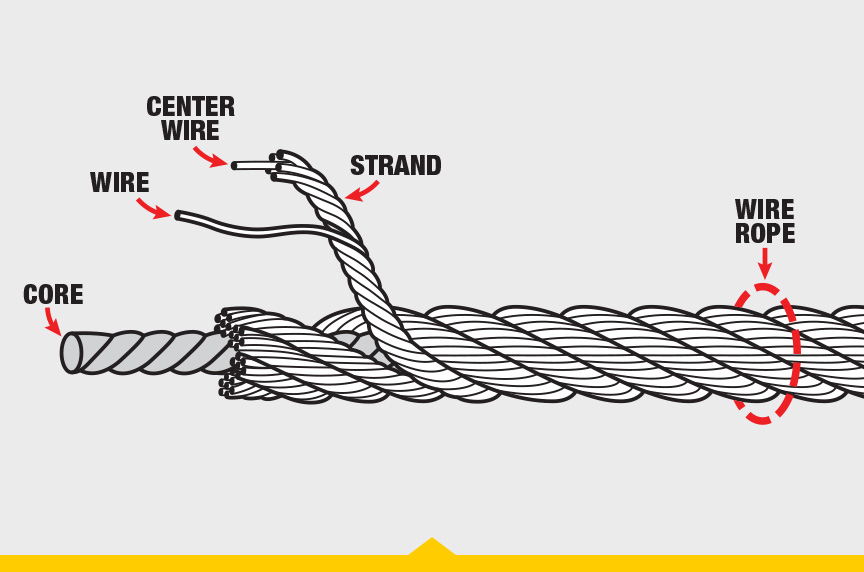
1. Core: The core is the central part of the wire rope, providing support and stability to the entire structure. It can be made from either fiber or steel, depending on the application's requirements. Fiber cores are lighter and more flexible, while steel cores offer greater strength and rigidity.
2. Wires: The wires are the individual strands that are twisted around the core. They are made from high-tensile steel and are arranged in layers, with each layer having a different number of wires. The number of wires and their arrangement determine the rope's overall strength, flexibility, and weight.
3. Strands
Strands of wire rope consist of two or more wires arranged and twisted in a specific arrangement. The individual strands are then laid in a helical pattern around the core of the rope.
Strands made of larger diameter wires are more resistant to abrasion, while strands made of smaller diameter wires are more flexible.
4. Lubrication: Lubrication is applied to the wire rope to reduce friction and wear during use. It helps protect the rope from corrosion and extends its lifespan. Lubricants can be either oil-based or water-based, depending on the specific requirements of the application.
4. Terminal Fittings: Terminal fittings are the attachments at the ends of the wire rope, used to connect it to other components or machinery. These fittings can be eye splices, hooks, thimbles, or other types of connectors, depending on the intended use.
In conclusion, the components of wire rope play a crucial role in determining its performance and durability. Understanding these components and their functions is essential for selecting the right wire rope for a particular application. From the core to the wires, lubrication, and terminal fittings, each component contributes to the rope's overall strength, flexibility, and reliability.
Wire Rope Construction
Wire rope is typically constructed using a combination of carbon steel wires. These wires are cold-drawn to ensure consistent diameter and mechanical properties. The wires are then twisted into strands, and multiple strands are twisted together to form the final rope. The number of strands, their arrangement, and the type of steel used determine the rope's strength, flexibility, and durability.
Wire Rope Specifications
Wire rope specifications are crucial for selecting the right rope for a particular application. Key specifications include:
1. Diameter: The diameter of the wire rope determines its load-bearing capacity and flexibility. Larger diameters provide higher strength but may be less flexible.
2. Material: Carbon steel is the most common material used for wire rope, but other alloys like stainless steel and galvanized steel are also available for specific applications.
3. Grade: The grade of steel wire used affects the rope's tensile strength and resistance to corrosion. Higher grades offer superior performance.
4. Number of Strands: The number of strands and their arrangement determine the rope's structure and overall performance. Common configurations include 6x19, 6x37, and 8x19.
5. Core: The rope's core can be either fiber or steel. Fiber cores provide better flexibility, while steel cores offer increased strength.
6. Lay types : Direction and type of lay refer to the way the wires are laid to form a strand (either right or left) and how the strands are laid around the core (regular lay, lang lay, or alternate lay).
Regular Lay – The wires line up with the axis of the wire rope. The direction of the wire lay in the strand is opposite to the direction of the strand lay. Regular lay ropes are more resistant to crushing forces, are more naturally rotation-resistant, and also spool better in a drum than lang lay ropes.
Lang Lay – The wires form an angle with the axis of the rope. The wire lay and strand lay around the core in the same direction. Lang Lay ropes have a greater fatigue-resistance and are more resistant to abrasion
The advantages of regular lay ropes are:
? Better structural stability
? Higher number of broken wires are allowed
? Easier identification of broken wires
The advantages of lang’s lay ropes are:
? Better contact in the groove of the sheaves
? Superior resistance to wear
? Longer lifetime in case of high dead loads
? Considerably better spooling behavior on a multi-layer drum
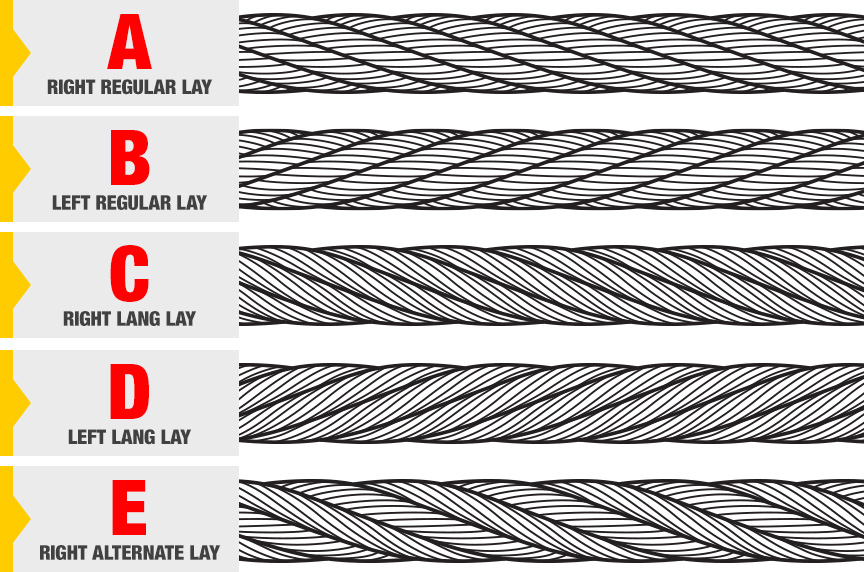 7. Finish of Wires
Zinc coated (galvanized), zinc/aluminum alloy coated (mischmetal), stainless steel, or unfinished steel (“bright”).
8.Preformed or Non-Preformed
On a preformed wire rope, the strands and wires are formed during the manufacturing process to the helical shape that they will take in a finished wire rope.
7. Finish of Wires
Zinc coated (galvanized), zinc/aluminum alloy coated (mischmetal), stainless steel, or unfinished steel (“bright”).
8.Preformed or Non-Preformed
On a preformed wire rope, the strands and wires are formed during the manufacturing process to the helical shape that they will take in a finished wire rope.
Preformed rope can be advantageous in certain applications where it needs to spool more uniformly on a drum, needs greater flexibility, or requires more fatigue-resistance when bending.
Different types of wire rope
Paralell lay steel wire rope
The lay length of the wires in the different layer is the same. The outer wiresare in the position of the valley formed by the inner wires. The wires contactseach other in a line state. This kind of strand is much tight. The breaking forceis higher. No secondary bending force between the wires. The fatigue life ishigher.

Compacted strand ropes
The wires contacts each other in a line state in the strand. This kind of strandis much tight. The breaking force is higher.No secondary bending force between the wires. The contact area beteen therope and the sheave is bigger. lt has a higher wear resistance and longerfatigue life.

Shaped strand wire rope
The strand shape is not a round. lt is called a shaped strand wire rope. Thereare triangular strand, oval strand, and sector strand.The contact area betweenthe rope with the sheave is 3 to 4 times compare with the round srand rope.The contact force between the rope with the sheave is smaller. The fatigue life2 to 3 times higher than the round strabd rope. The contact points betweenthe strands inside the triangular rope are much more. The fatigue life ishigher. The metalic area is higher. The breaking force is higher than the roundstrand ropes by 25%.
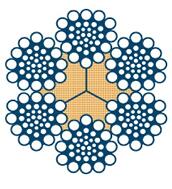
Non rotating and micro-rotating wire rope
When using a single lifting rope or multi-rope lifting in a higher distance , it isvery easy to rotation. This will reduce the service life and the safty of theoperators. The special desgined non-rotating or micro-ratating ropes includemulti-layer strand rope, triangular strand ropes, 4-strand ropes, sector strandropes, and oval strand ropes.

Plastic Impregnated (PI) Wire Rope
Plastic filled wire ropes are impregnated with a matrix of plastic where the internal spaces between the strands and wires are filled. Plastic filling helps to improve bending fatigue by reducing the wear internally and externally. Plastic filled wire ropes are used for demanding lifting applications.
Plastic Coated or Plastic Filled IWRC Wire Rope
This type of wire rope uses an Independent Wire Rope Core (IWRC) that is either filled with plastic or coated in plastic to reduce internal wear and increase bending fatigue life.
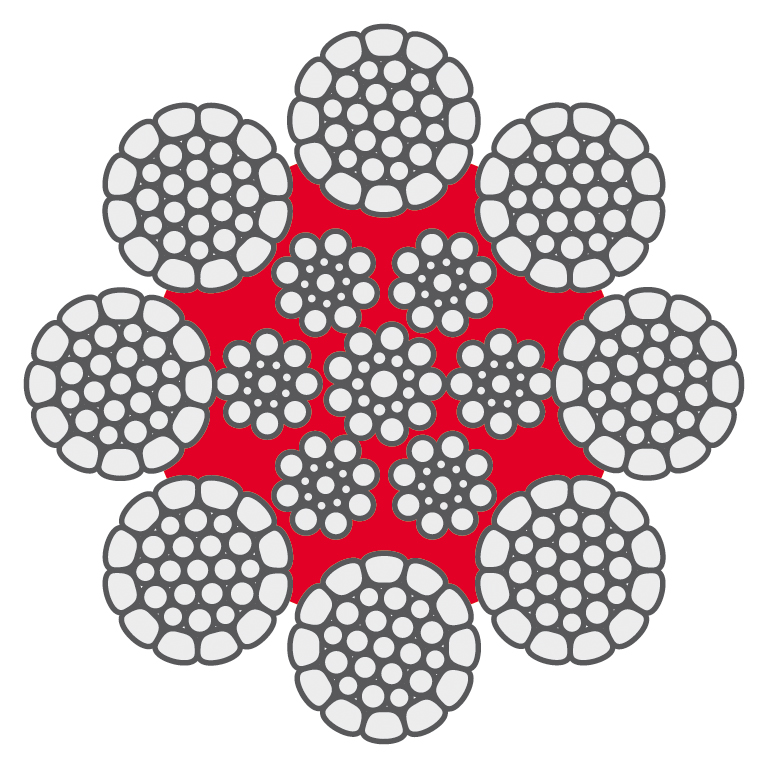
Plastic Coated Wire Rope
A plastic coating can be applied to the exterior surface of a wire rope to provide protection against abrasion, wear, and other environmental factors that may cause corrosion. However, because you can’t see the individual strands and wires underneath the plastic coating, they can be difficult to inspect.
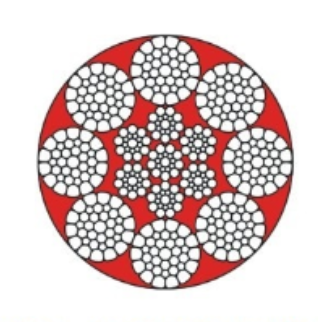
Conclusion
Wire rope is a crucial component in various industries, and understanding its specifications and construction is essential for making informed choices. By considering factors like diameter, material, grade, number of strands, and core type, one can select the most suitable wire rope for their specific application.
When it comes to wire ropes, our company is your one-stop shop for all your needs. With a vast array of wire ropes available in different sizes, strengths, and finishes, we cater to a diverse range of industries and applications.
Our wire ropes are made from high-quality materials, ensuring durability and reliability. Whether you need wire ropes for construction, mining, marine, or any other industrial use, we have the perfect solution for you.
Our team of experts is dedicated to providing exceptional customer service and technical support. We understand that each project has unique requirements, and we are committed to working closely with you to ensure that you get the right wire ropes for your specific needs.
So, if you're looking to purchase wire ropes, don't hesitate to contact us. We would be delighted to discuss your requirements and provide you with a competitive quote. Whether you're a small business owner or a large corporate entity, we guarantee quick turnaround times and competitive prices.
Remember, when it comes to wire ropes, quality matters. Choose us for your wire rope needs, and we assure you of top-notch products and services. Contact us today, and let's get started on your project!
Email:[email protected]
Call / Whatsapp: +86-15573139663






